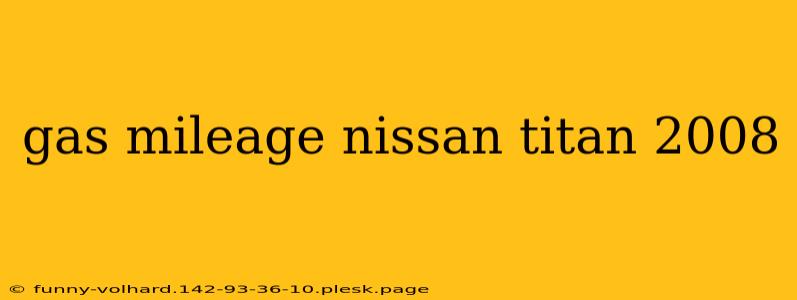The 2008 Nissan Titan, a full-size pickup truck known for its robust build and towing capacity, isn't exactly renowned for stellar fuel economy. Understanding its gas mileage is crucial for potential buyers and current owners alike. This guide dives deep into the factors affecting fuel efficiency in the 2008 Titan, offering insights to help you maximize your miles per gallon (MPG).
2008 Nissan Titan MPG: What to Expect
The EPA estimates for the 2008 Nissan Titan vary depending on the engine and drivetrain configuration. Generally, you'll find that fuel economy is lower than many competitors in the same class. Expect figures in the range of:
- 13-15 MPG City: Urban driving, with its frequent stops and starts, significantly impacts fuel efficiency.
- 17-19 MPG Highway: Highway driving, with its consistent speed, typically yields better gas mileage.
- Overall MPG (Combined): A combined city/highway average falls somewhere between these figures, usually around 15-17 MPG.
Important Note: These are just estimates. Your actual gas mileage will depend on several factors, discussed in detail below.
Factors Affecting 2008 Nissan Titan Gas Mileage
Several variables contribute to the actual gas mileage you achieve with your 2008 Nissan Titan. Understanding these factors can help you improve your fuel economy:
1. Driving Habits:
- Aggressive Acceleration and Braking: Jackrabbit starts and hard braking significantly reduce fuel efficiency. Smooth, gradual acceleration and braking are key.
- Speed: Maintaining a steady, moderate speed (around 55-65 mph) on the highway is more fuel-efficient than high-speed driving.
- Idling: Minimize idling time. Turn off your engine if you'll be stopped for more than a minute.
2. Vehicle Condition:
- Tire Pressure: Properly inflated tires are crucial for optimal fuel economy. Under-inflated tires increase rolling resistance. Check your tire pressure regularly and inflate them to the recommended pressure listed in your owner's manual.
- Regular Maintenance: Ensure your vehicle receives regular maintenance, including oil changes, air filter replacements, and tune-ups. A well-maintained engine runs more efficiently.
- Payload and Towing: Hauling heavy loads or towing a trailer drastically reduces gas mileage. The heavier the load, the more fuel your Titan will consume.
3. Terrain and Climate:
- Terrain: Driving uphill or in mountainous areas requires more fuel than driving on flat terrain.
- Climate: Extreme temperatures (both hot and cold) can negatively impact fuel efficiency. Cold weather, in particular, can make it harder for your engine to start and run efficiently.
Tips for Improving 2008 Nissan Titan Gas Mileage
By implementing the following strategies, you can potentially improve your 2008 Nissan Titan's fuel economy:
- Drive Predictably: Anticipate traffic and driving conditions to avoid sudden acceleration and braking.
- Maintain Proper Tire Inflation: Check your tires regularly and inflate them to the recommended pressure.
- Regular Maintenance is Key: Keep up with scheduled maintenance to ensure optimal engine performance.
- Reduce Payload and Towing When Possible: Minimize the weight you carry in your truck and avoid towing unless necessary.
- Consider Fuel Additives: Some fuel additives claim to improve fuel efficiency. While the results may vary, they are worth considering.
Conclusion
While the 2008 Nissan Titan isn't known for exceptional fuel economy, understanding the factors that influence MPG and implementing fuel-saving strategies can make a noticeable difference. By driving efficiently and maintaining your vehicle properly, you can maximize your gas mileage and reduce your fuel costs. Remember to always consult your owner's manual for specific recommendations on maintenance and tire pressure.

